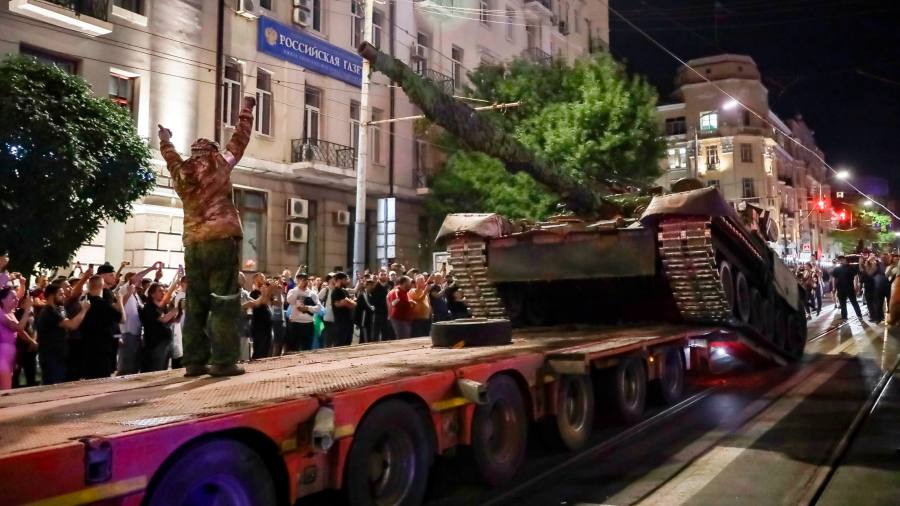Receive free War in Ukraine updates
We’ll send you a myFT Daily Digest email rounding up the latest War in Ukraine news every morning.
Western nations have explored contingencies in the aftermath of Yevgeny Prigozhin’s attempted insurrection in Russia, including the threat to nuclear stockpiles from an unstable regime in Moscow.
Talks led by G7 members have included how a weakening of Vladimir Putin’s control over security and military forces could affect the state’s stability, people briefed on the discussions told the Financial Times.
Diplomats said alarm over possible negative outcomes from the rebellion against Putin’s regime laid bare the lack of consensus in the west on the ultimate goal of backing Ukraine’s fight against Russian aggression.
“[The weekend’s events] made clear that we are not in agreement on the outcomes of what will happen if Ukraine wins this war and what that will do to Russia,” a western official said, on condition of anonymity.
Some western nations, including G7 members, discussed the need for Ukraine not to take advantage of the current situation by, for example, launching attacks on Russian territory with the aim of increasing instability.
Prigozhin’s fighters aborted their rebellion on Saturday some 200km from Moscow after taking a city and shooting down multiple Russian military aircraft. Western officials have said the deal on Saturday decisively weakens Putin’s control.
Discussions between G7 officials over the weekend included the potential prospect of Wagner obtaining control of nuclear weapons, according to people briefed on the talks.
“[Will] military failure destroy Russian political power or will the prior destruction of [Russia’s] political system lead to military disaster?” posed one senior western diplomat who said western countries needed contingency plans. “There are so many possible scenarios.”
At a Monday meeting of EU foreign ministers in Luxembourg, some stated that it is not in Europe’s interest to destabilise Russia, according to people briefed on the conversations.
“We are not in the business of regime change,” said one of those people.
“The message to those getting carried away is that nobody wins from civil war in Russia,” said one EU diplomat briefed on the discussions between ministers.
“We are analysing this carefully,” German foreign minister Annalena Baerbock told reporters ahead of that meeting. “There are also risks involved, which we are still unable to assess at the moment.”
While allies agree that they want Ukraine to win the war, there is no clear position on what that victory would look like and how it could affect Russia, although it is widely accepted that a catastrophic defeat of the Russian army would shatter Putin’s regime.
“You could have someone more radical than Putin in Moscow; some might draw the conclusion that it could be quite worrying,” said a senior EU official. “What do we do if we have Prigozhin leading in Moscow, if it is a possible scenario or not?”
Rishi Sunak, the UK’s prime minister, said on Monday that it was “too early to predict” the consequences of the insurrection, but the UK was prepared “for a range of scenarios”.
American officials held a series of marathon meetings over the weekend analysing the events and possible outcomes. President Joe Biden said it was “too early to reach a definitive conclusion”.
“No matter what comes next, I will keep making sure that our allies and our partners are closely aligned,” he added. US officials say they have not seen any change in Russia’s nuclear posture.
In Congress, some proponents of sending more effective weapons systems to Ukraine, such as long-range ATACMS artillery, said they thought the Wagner insurrection could hinder the effort to convince the Biden administration, which is wary of destabilising Russia.
Chris Murphy, a Democratic senator on the Senate foreign relations committee, told the FT there was no interest “in a Russian civil war”. He said: “You do not want political or military chaos inside a country that has a massive nuclear arsenal.”
American officials sent diplomatic messages to Russia over the weekend making clear that they were not involved in the events and considered them an internal Russian matter. They urged Russia not to use nuclear weapons or escalate, current and former US officials said.
Additional reporting by Lucy Fisher in London
Read the full article here




